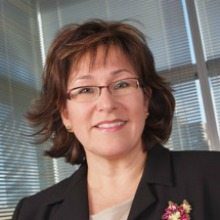
Maria Horton is founder and CEO of EmeSec Inc., founded in 2003. For over 20 years, she was in the U.S. Navy (where she achieved the rank of Commander), and was CIO for the National Naval Medical Center. Today at EmeSec, she is focused on cybersecurity and its drastically approaching changes.
Horton spoke with WashingtonExec about why she began EmeSec, Inc., how her military background has influenced her leadership style, what she thinks about FedRAMP, cyber intelligence, and more.
WashingtonExec: Can you tell us about EmeSec, Inc. and what made you want to start your own company?
Maria Horton: EmeSec, Inc. is a Service Disabled Veteran Owned Small Business (SDVOSB), woman-owned (WO), and (8a) that is focused on providing cybersecurity solutions. Prior to starting EmeSec in 2003, I was CIO for the National Naval Medical Center (NNMC). When you look at cloud, mobile, and wireless security, these are all things we couldn’t deal with 20 and even 10 years ago in the same way that we do today.
_______________________________________________________________________________________________
“Since 2003, EmeSec has since grown and flourished. It follows my philosophy, which was how the company was named: to ensure, to manage, and to evolve security.”
_______________________________________________________________________________________
WashingtonExec: How has your military background influenced your leadership style?
Maria Horton: It’s a tremendous advantage in many ways. Having worked for the Navy for more than 20 years has forced me to operate within systems and boundaries as they exist and adapt either my leadership style or my goals to those boundaries. It has also affected the way I approach the milestones within the boundaries to focus on being creative, innovative, and successful.
I’ve dedicated my career to seeking to innovate and drive positive change. The best lesson I learned while working for the government was the ability to anticipate and adapt to changes on the horizon.
WashingtonExec: What would be a piece of advice when you decide you need to switch companies and start a new career path? What made you want to take the jump?
Maria Horton: I want to meet my personal potential and go as far as I can, whether it is as it related to my intellect, my skillset, or my capabilities. I think about my life and my career in 10-15 year segments: what can I accomplish, how can I expand beyond that, and how are they either interconnected or interlinked?
WashingtonExec: How have you seen the federal government change over the last several years, in terms of cybersecurity, cultural mindset, or actual capabilities?
Maria Horton: Over the last three years, we’ve seen many agencies, including DoD, cover the policy and the procedure aspect of security. Today, we are focusing a lot more on better execution and continual improvement. From a technological standpoint, we’ve seen growth in innovation as agencies start to look at cloud adoption by utilizing policies such as “Cloud First” and programs such as FedRAMP. As an ISO-based and accredited FedRAMP Third Party Assessment Organization (3PAO), EmeSec believes the growth of innovation stems from harnessing resources to help change perceptions and attitudes. Cloud computing is a great example of that.
_______________________________________________________________________________________________
“Looking forward, we’re going to see more agencies change their execution strategy to make innovative solutions top-of-mind.”
_______________________________________________________________________________________
WashingtonExec: Where are we as a nation in terms of cybersecurity awareness and cyber hacking prevention? How safe is the federal government, or U.S. citizens for that matter?
Maria Horton: I believe education is key in cybersecurity awareness. We need to educate all members of society on how information is being shared and how to identify ways in which our information can be misused. There is an art and a science to cyber intelligence that includes all aspects of the cyber world. The focus is really on technology and what capabilities are present. I think you’ll see a transition from cybersecurity to cyber intelligence – a more holistic approach to dealing with the real and potential threats we face.
WashingtonExec: Why are you such a big supporter of FedRAMP?
Maria Horton: EmeSec is celebrating our ten-year anniversary this year and over the past decade, we’ve been looking at the evolution and maturation of cybersecurity and information assurance. As a small company at $7 million, we saw FedRAMP as a natural extension to our core services and are now one of the 16 designated 3PAOs. With this status, we are able to assist our customers to make better decisions by acting as a translator of risk for technical requirements and capabilities. I also think that FedRAMP will be a model for future of sharing knowledge, adaptation, and security efficiently.
WashingtonExec: What was your first job?
Maria Horton: I grew up in southwestern Pennsylvania and my parents had their own catering service and I worked for them as a waitress. In this profession, you encounter many different people. Learning to interact well with customers and individuals is an important aspect to any job.


